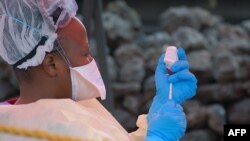The United States is committed to stopping the Ebola outbreak in the Democratic Republic of the Congo, also known as the DRC. Nearly 2,900 people have been infected since the outbreak began over a year ago, with nearly 2,000 fatalities.
US Agency for International Development, or USAID, Administrator Mark Green recently traveled to the DRC to support and strengthen the ongoing response to the second largest outbreak of Ebola in history. He met with officials from the Government of the DRC, non-governmental organizations, United Nations, and donors. Administrator Green discussed ways to better engage Ebola-affected communities in the response, strategies to increase donor funding, and ways to keep healthcare workers safe.
USAID’s Disaster Assistance Response Team, comprised of U.S. government experts and supported by staff at U.S. Embassy Kinshasa, is on the ground in the DRC to help end the outbreak. Together with partners, the United States has trained more than 19,200 healthcare workers on best practices to avoid infection, supported 1,680 people to conduct disease surveillance, and strengthened infection prevention and control measures in more than 360 health facilities. The United States has also provided enough food for 300,000 people and reached more than two million people with critical messaging to stop disease transmission and improve local community health.
Speaking at a press roundtable in the DRC, Administrator Green cited conflict and corruption as impacting the Ebola response and emphasized that “fighting Ebola is not just a medical crisis; it is a development crisis.” USAID is helping to address underlying development issues in the region in order to improve community trust and communication.
The United States views its partnership with the DRC as a high priority, said U.S. Ambassador to the DRC Michael Hammer. “That’s why we have technical experts here from the Centers for Disease Control and Prevention, who have two decades plus of a relationship with Congolese health authorities.” The United States also has the National Institutes of Health on the ground in the DRC working on clinical studies of promising Ebola treatments.
“We see this partnership with Congo as very important,” said Ambassador Hammer, “not just for Congo and the American people, but for the world.”














